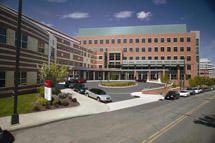
Rutgers Cancer Institute
Comprehensive Cancer Center
Steven Libutti, M.D., FACS, Director
New Brunswick, New Jersey
Main:
(732) 235-2465
Rutgers Cancer Institute became New Jersey’s only NCI-Designated Cancer Center in 1997 and achieved Comprehensive Cancer Center status in 2002. There are over 300 Members from across Rutgers University, Princeton University (its Consortium partner since 1994), and other collaborating institutions; these scientists conduct innovative basic, clinical, translational, and population research. Funding from the Cancer Center Support Grant and institutional/philanthropic support are leveraged to support Members’ promising novel pilot projects and to recruit researchers in areas of strategic need for the Research Programs. Rutgers Cancer Institute is likewise committed to contributing to the evolution of the next generation of investigators in cancer-related basic, clinical, population, and catchment area relevant science. An array of broad-based, multidisciplinary training and career enhancement opportunities are offered to trainees ranging from high school students to junior faculty.
Initiatives are integrated throughout the Rutgers Cancer Institute's operations and strategic planning, partly in recognition of the rich population of its catchment area, the State of New Jersey. Rutgers Cancer Institute’s commitment to New Jersey communities is enhanced through engagement with a Community Cancer Action Board (CCAB) of patient advocates and community members. Coordinated by the Office of Community Outreach and Engagement, the CCAB provides valuable guidance on the Cancer Institute’s strategic plan, catchment area priorities, promotion of diversity in cancer clinical trials, and investigators’ research. Another service to New Jersey communities is ScreenNJ, a state-wide initiative where Rutgers Cancer Institute partners with, connects with, and supports numerous healthcare delivery agencies, public health agencies, and community organizations that provide cancer control outreach, referrals, or cancer prevention, screening, and treatment services. Rutgers Cancer Institute further provides statewide access to outstanding clinical care through its partnership with RWJBarnabas Health (RWJBH), the largest integrated academic healthcare delivery system in the State of New Jersey, thereby delivering the most advanced cancer treatment options (including clinical trials and novel therapeutics such as immunotherapy and precision medicine) to patients throughout the catchment area.
Research at Rutgers Cancer Institute of New Jersey
Rutgers Cancer Institute’s research programs include Cancer Metabolism and Immunology, Genomic Instability and Cancer Genetics, Cancer Pharmacology, Clinical Investigations and Precision Therapeutics, and Cancer Prevention and Control. These programs are supported in part by comprehensive shared resources, which include Biomedical Informatics, Biostatistics, Biospecimen Repository and Histopathology Service, Cancer Prevention and Outcomes Data Support, Comprehensive Genomics, Genome Editing, Immune Monitoring and Flow Cytometry, Metabolomics, and an emerging Organoid Development Service.
These cancer-focused programs are key to Rutgers University’s strengths in biomedical sciences, which contributed to the NIH Research Evaluation and Commercialization Hubs (REACH) grant to Rutgers Cancer Institute to develop the Rutgers Optimizes Innovation (ROI) Program. Through ROI, Rutgers Cancer Institute is collaborating with other Rutgers clinical, engineering, and scientific units to rapidly translate biomedical discoveries into commercially viable diagnostics, devices, therapeutics, and tools to improve patient care, enhance health, and train the next generation of innovators.
Additional major grants from NIH/NCI, the US Department of Defense, and other agencies, along with strategic industry partnerships and institutional/philanthropic support, enable cutting-edge scientific investigation resulting in new and better treatments offered through a comprehensive clinical trials infrastructure, including the Phase I/Investigational Therapeutics Program. Rutgers Cancer Institute further advances cancer clinical trials through collaborations with cooperative groups, industry, academia, and other NCI-Designated Cancer Centers.
Select Scientific Initiatives at Rutgers Cancer Institute of New Jersey
Rutgers Cancer Institute’s multidisciplinary teams lead innovative cancer research, conduct statewide community outreach and engagement, train the next generation of cancer researchers, and foster a environment for its personnel, patients, and community.
- Rutgers Cancer Institute’s mechanism to deliver community outreach and engagement (COE) activities to address catchment area cancer burden and community needs. Its strong network of community partnerships comprises hundreds of partner organizations and sites throughout every New Jersey county. The COE implements ScreenNJ, which partners with, connects with, and supports healthcare delivery agencies, public health agencies, and community organizations that provide cancer control outreach, referrals, or directly provide cancer prevention, screening, and treatment services.
- The Cancer Research Training and Education Coordination group offers seminars, internships, and other training opportunities for trainees spanning undergraduate, graduate, postdoctoral, and junior faculty levels, and secured several NCI training grants.
- The Cancer Immunology and Metabolism Center of Excellence helps scientists to better understand the immune response to cancer and how it is regulated. The goal is to develop the foundation for new treatments and make existing therapies more effective.
- The NJ Pediatric Hematology and Oncology Research Center of Excellence’s (NJ PHORCE’s) mission it to improve the lives of children diagnosed with cancer or blood disorders through research, training and education, community engagement, and public policy advocacy.
- The Cancer Survivorship and Outcomes Center strives to foster better care and resources to improve quality of life and enhance outcomes for cancer survivors in New Jersey. Its goals include identifying and monitoring unmet needs and disparities, medical outcomes, and quality of life outcomes by building a statewide survivor cohort; developing and implementing best-practice survivorship care standards at the patient, provider, and health care system level; and fostering clinically-integrated survivorship outcomes research across the RWJBH System.
- The Precision Medicine Oncology Program provides patients with a targeted treatment approach that goes beyond treating the disease and is based on and tailored to multiple aspects of a patient’s health, such as their genetic makeup, environmental factors, and lifestyle choices. Referrals for Precision Medicine Oncology are conducted via clinicians presenting patient cases at Molecular Tumor Board (MTB) meetings. These meetings are attended by relevant clinicians as well as basic scientists and trainees from across the Consortium. Each case discussed not only results in clinical recommendations, but often results in research recommendations for follow-up translational studies. Therefore, while the MTB functions as a clinical service, it plays an additional key role in transdisciplinary and/or supradisciplinary translational research.
* Information on this cancer center profile was provided by Rutgers Cancer Institute.